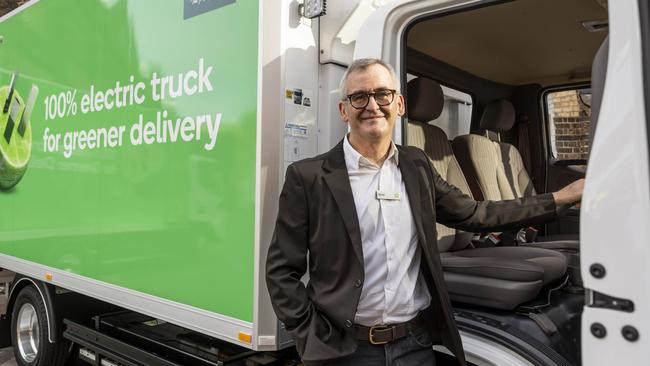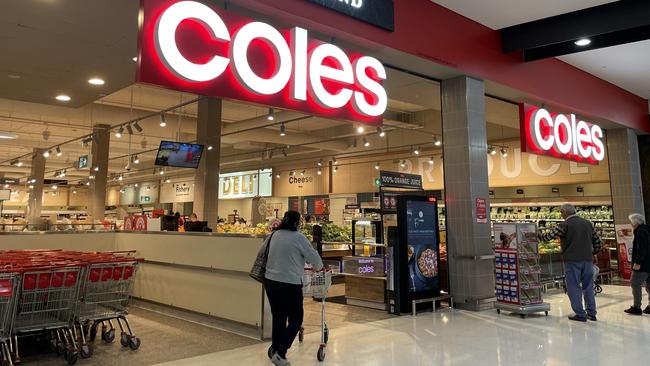Why we need more CEOs to speak up for profits
The supermarkets boss has cut through with a reminder about the purpose of her business.

Business
Don't miss out on the headlines from Business. Followed categories will be added to My News.
Coles’ Leah Weckert issued an important reminder to corporate Australia: Profit is not a dirty word.
Weckert’s comments have come right at the tail end of a resilient earnings season, and the newish Coles boss has cut through with a reminder about the purpose of her business: To look after shareholders through delivering the sharpest value to her customers.
Supermarkets and Woolworths boss Brad Banducci in particular, have been in the firing line around profits they make.
The big two retailers have become an easy target for claims around price gouging and anti-competitive behaviour while Australia is in the midst of an inflation bubble.
This has now spiralled into a Greens-led Senate inquiry and a year-long Australian Competition and Consumer Commission Review into the supermarkets. These will be highly distracting for management and, like the previous ACCC review into supermarket pricing a decade ago, will probably amount to little.

Everyone else is jumping on board with the ACTU and Queensland’s Steven Miles demanding their own probe. The claims are easy to make and always missing from the barbs is what should be the right level of profit for a business to make. No one is willing to go there and nor should they.
Still the attack on profit from all sides of the political spectrum is a worrying trend. Businesses exist to make profit and reward shareholders. In doing so they invest money into the economy and create jobs. The trick is in the balancing act to make sure the pursuit of profit is sustainable over the long run and businesses keep one eye on their social licence to operate.
Banducci, who this month announced his retirement, has struggled to cut through with a simple message on this point and his trainwreck interview on ABC TV only fanned the flames.
Banducci is the architect of Woolies much-needed cultural transformation and this month conceded to The Australian he was the first to get upset with himself when he doesn’t represent his company accurately.
In the middle of the anger, Woolworths triggered some big non-cash writedowns of its business, tipping the retailer into a heavy bottom-line loss.
Commonwealth Bank boss Matt Comyn is the only other boss who is prepared to issue a spirited defence of profits. Comyn regularly points out his bottom-line returns go to millions of shareholders as well as generate the crucial capital so funds can be lent back out to grow the economy.
Weckert, promoted to the top job in May last year, delivered her numbers on Tuesday which included a 3.9 per cent dip in December half net profit to $594m. The numbers show Coles is selling more, with revenue up nearly 7 per cent, but costs are crimping profit margins. Where Weckert draws the line is criticism of the windfall dollars.
“Profits are an essential thing for any business,” Weckert says. “They enable us to continue to operate and for us that means we get to employ 120,000 people. We get to support thousands of suppliers. We pay a very large tax bill every year.”
Coles has more than 460,000 shareholders and many of these are retail investors – the so-called mums and dads. There are millions more who benefit indirectly from the dividends through their super funds.

The simple message Weckert will take to next month’s Senate inquiry that begins in Hobart is that Coles generates $2.60 for every $100 spent by customers.
This is “less than 3c on the dollar,” she says, and points to her profit margins now being stable for at least the past five years, including through an inflation spike. Nor is food inflation unique to Australia, she adds, It’s are often driven by a surge in input costs such as fertilisers or wheat. Indeed, many developed economies, particularly the UK and in Europe, have seen food prices rise at a faster pace.
Weckert says Australian supermarkets are facing more intense competition than ever as offshore giants Aldi, Costco and Amazon make big inroads. Wesfarmers’ Bunnings and Priceline, along with Chemist Warehouse, are making inroads into the non-food sector.
Meanwhile, supermarket customers are trading convenience over value and are using local specialists from butchers to bakers.
The numbers show Coles now has the momentum in the sales race against its rival, Woolies. It can be argued Woolies is more distracted than it has been in years with problems from New Zealand, Big W and its looming leadership transition.
Coles’ supermarkets sale jumped 4.9 per cent in the first eight weeks of the calendar year, while Woolworths delivered 1.5 per cent growth over the first seven weeks. This helped back a near 6 per cent jump in Coles’ shares.
Coles says it is getting on top of the jump in theft rates it experienced last year as it invests more in checkout technology.
This could make a big difference to its earnings line in coming halves as it continues to get theft rates down further.
Australia’s housing and building shortage is now becoming a force on the ASX, although it has taken global players to recognise the value.
Housing squeeze goes global
French building materials major Saint-Gobain finally got the backing from CSR’s chairman John Gillam and the board, for a friendly buyout that values the 169-year-old company at more than $4.3bn. This comes as Irish giant CRH earlier Tuesday secured board backing for its $2.1bn friendly bid for cement major Adelaide Brighton.
The takeovers represent nearly $10bn of buyout announcements this month in a scramble for control of the companies making the walls, roofs, bricks and foundations that go for the nation’s housing stock.

There are two structural tailwinds set to underpin construction in Australia until the end of the decade, even with a rocky start from having interest rates sitting at decade long highs.
This includes the strong demand coming from net overseas migration that is driving population growth and creating demand for housing stock.
At the same time, both federal and state governments are throwing everything at bolstering the supply of new housing, including trying to untangle the planning hurdles. This will see substantial investment flow into construction.
Indeed, the Albanese government has set an ambitious goal of 1.2 million homes over 5 years. In getting there, this would need above record levels of residential construction every quarter between now and the end of the decade.
CSR has long since exited the foundation sugar business and these days is a leader in plasterboard, bricks and roofing. It is also a 25 per cent owner of NSW’s energy hungry Tomago smelter, the nation’s biggest aluminium manufacturer.
CSR formed part of the Australian big three – James Hardie and Boral being the others that took on the world with building materials to various success.
Today, James Hardie is still listed on the ASX, but it is a mostly US-focused company with a management team that sits in Chicago, and it pays taxes at a group level in Ireland. Boral, meanwhile, has been stripped back to an upstream materials of cement and quarries where profits are now booming. The Stokes’-backed Seven Group last week lobbed a $2bn bid to buy out Boral’s minority shareholders.
But the trend is in offshore players muscling in on the Australian market. This includes Germany’s Knauf group that snapped up Boral’s well-regarded plasterboard operations, while last October Belgium’s Etex paid $155m for Buckeridge’s plasterboard and fibre cement business.

The buyouts of CSR and Boral comes as their shares are already pushing cyclical highs, suggesting there is more upside to come.
The flurry of deals leaves the Soul Patts-backed Brickworks as one of the only listed volume building materials players left. Brickworks shares have jump another 5 per cent in recent days to push a new record high of $30 each.
And with the money flowing in mostly from European bidders, this suggests they are confident in being able to work around Australia’s rickety energy network over the long term. In manufacturing, energy costs are among the biggest underlying costs.
CSR sees the pipeline of future demand for detached housing under construction is running at around 50 per cent above historical averages and represents 2 to 3 years of work.
Boral too has called out a strong long-term demand for infrastructure projects, although expects spending to start switching from hard infrastructure like road and tunnels to soft projects like housing and healthcare facilities towards the end of the decade.
Saint-Gobain has gone for a knockout $9 a share offer after several weeks of due diligence, and this means it has gone in with its eyes open.
CSR’s long-tail liabilities from its historical asbestos business, although these have been declining from a peak of $450m more than a decade ago, they stand at $187m. On Tamago, Saint-Gobain has said it supports the manufacturer’s switch to renewables, although it is unlikely the French giant wants to be a long-term investor in the plant.
Talks between CSR and Saint-Gobain have been running since early January. The two companies share a licensing partnership around glass recycling used to make insulation batts.
CSR’s Gillam, the former long-running boss of Bunnings, said the offer represents attractive value with a 33 per cent premium to the pre-bid offer and nearly 50 per cent above the average trading price of the past six months. To underscore how much Saint-Gobain was willing to pay up, analysts have calculated the offer price represents 21.5 times CSR’s price to earnings and 15.9 enterprise value to earnings.
Gillam argues the offer “is a testament to the transformation” that has taken place in CSR in recent years, under chief executive Julie Coates.
The French company is a global player in building materials with a market value at around $58bn and employs more than 168,000 around the world. There are likely to be limited competition issues as the deal pushes ahead through a scheme of arrangement, given Saint-Gobain only has a small footprint in Australia.
johnstone@theaustralian.com.au
Originally published as Why we need more CEOs to speak up for profits



